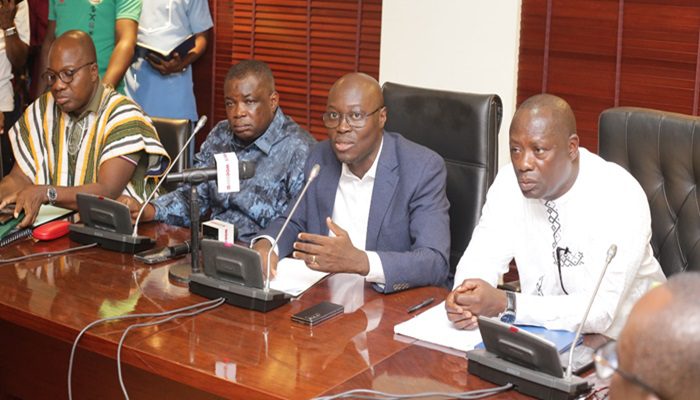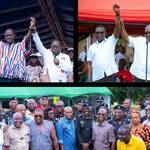The decision by the Minority National Democratic Congress (NDC) to disregard a Supreme Court ruling has set the tonne for a possible constitutional and political crisis, one that could have far-reaching consequences for the country’s democracy, governance, and national stability.
Despite a Supreme Court injunction preventing the Speaker of Parliament from declaring the seats of four Members of Parliament (MPs) vacant, the minority NDC Caucus has rejected the ruling insisting on being the majority.
This defiance raises serious concerns about the respect for the rule of law in Ghana and the broader implications of disregarding the decisions of the nation’s highest court.
The Supreme Court injunction
The controversy began when the Speaker of Parliament, Alban Bagbin, declared four parliamentary seats vacant, citing that the MPs had defected from their original parties by filing to contest upcoming elections on different tickets.
Affected MPs
The affected MPs—Cynthia Morrison (Agona West), Kwadwo Asante (Suhum), Andrew Asiamah (Fomena), and Peter Kwakye Ackah (Amenfi Central)—represent both the ruling New Patriotic Party (NPP) and the NDC.
The minority NDC, which had temporarily gained a numerical majority in Parliament due to these vacancies, saw this as an opportunity to consolidate power.
However, the Supreme Court, led by Chief Justice Gertrude Sackey Torkornoo, ruled that the Speaker’s action violated the rights of the MPs’ constituents and temporarily halted the decision.
This ruling allows the affected MPs to remain in Parliament while the court proceedings continue.
Despite the court’s clear ruling, the minority NDC has publicly dismissed it by insisting that it is now the majority, further intensifying the political standoff.
Erosion of judicial authority
The Supreme Court is the highest judicial body in Ghana, and its rulings are binding on all institutions and individuals.
By disregarding the court’s decision, the minority NDC Caucus undermines the authority of the judiciary, one of the three essential arms of government.
If Members of Parliament, an institution that represents the people, can disregard the rulings of the highest court, it sets a dangerous precedent that could weaken the balance of power among the executive, legislature, and judiciary.
This disregard could lead to a constitutional crisis, threatening the very foundation of Ghana’s democratic system.
Undermining the rule of law
The rule of law is fundamental to any functioning democracy, ensuring that no individual or institution is above the law.
When a political party, particularly one that seeks to govern, disregards a Supreme Court ruling, it signals to the public and other institutions that laws can be selectively applied or ignored.
This erodes trust in the legal system and could lead to a culture of lawlessness, where court orders and legal decisions are disregarded at will.
If left unchecked, this could lead to widespread legal disorder and the breakdown of societal norms.
Potential for political instability and civil unrest
The minority NDC Caucus’ refusal to comply with the Supreme Court’s ruling risks sparking political instability.
In Ghana’s polarized political environment, this could result in protests, demonstrations, and possibly violence.
Supporters of the ruling party (NPP) or other political factions may view the actions of the NDC MPs as a power grab and tis could lead to heightened tensions and even clashes between opposing groups.
Such instability could undermine national peace and security, especially in a country praised for its peaceful democratic transitions.
Damage to Public confidence in democratic institutions
When political leaders openly defy the judiciary, it diminishes public confidence in state institutions and the democratic process.
Citizens may lose trust not only in the legal system but also in Parliament and the political parties involved.
This erosion of trust could lead to civil disobedience, as the public may feel that legal avenues for resolving disputes are ineffective.
If citizens perceive that justice is not being upheld, they may resort to taking matters into their own hands, further destabilizing the country.
Reputational damage and international consequences
Ghana is often seen as a model of democracy in West Africa, a region plagued by political instability.
Disregarding a Supreme Court ruling could tarnish the country’s international reputation, raising concerns about its commitment to the rule of law and democratic governance.
Such actions could also affect foreign relations and deter international investors, as political instability and a lack of respect for legal institutions are red flags for investors seeking stability.
This could have long-term economic implications for Ghana, as foreign investment plays a crucial role in the country’s development.
Personal liability for political leaders
Political leaders who disregard Supreme Court rulings may face personal consequences, including fines, imprisonment, or other legal actions.
The defiance of the NDC MPs of the Supreme Court ruling poses significant risks to Ghana’s democratic governance, legal framework, and social peace.
By disregarding the highest court’s ruling, the NDC MPs are setting a dangerous precedent that could encourage future political actors to act with impunity, further eroding the rule of law.
In a region where political instability is rampant, Ghana must continue to uphold its democratic principles and ensure that all political parties, institutions, and individuals respect the decisions of the judiciary.
Failure to do so could push the country towards a constitutional crisis, undermine public confidence in the political process, and damage Ghana’s hard-earned reputation as a stable democracy in West Africa.
Now more than ever, Ghana’s leaders must work together to safeguard the country’s democratic institutions and avoid actions that could destabilize the nation.




